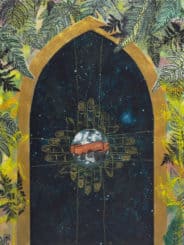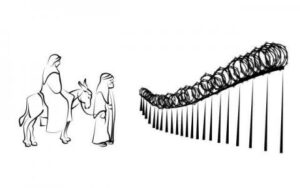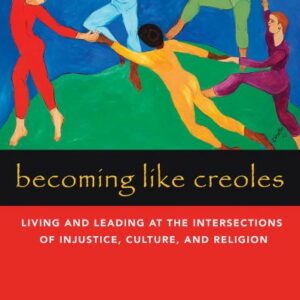Empathy as a practice is declining. Researchers call this the “empathy gap,” with some saying empathy is heading toward extinction. But there is hope.
One Million Thumbprints is an organization committed to seeking the end to violence against women and girls in conflict zones. Fueled by the story of Esperance, a Congolese woman who used her thumbprint as her signature with the request to “tell the world” her story, the heart and mission of One Million Thumbprints was born.
Through The Commissions Project, the beauty and justice initiative of Natalie Salminen Fine Art, One Million Thumbprints recently commissioned a painting, in connection with Brave Souls: Experiencing the Audacious Power of Empathy.
About the painting, artist Natalie Salminen writes: The painting I created was truly brought to fruition by the spirit of empathy. Because the heart and soul and deep conviction of One Million Thumbprints is that EMPATHY can and will change the world.
Holy Empathy: “tell the world”

Excerpted from Brave Souls by Belinda Bauman:
Many seem to have forgotten how to understand one another. One seminal study analyzed levels of empathy in more than fourteen thousand US college students over three decades. The results were alarming: a whopping 75 percent cared significantly less about others than the same demographic thirty years before. Studies also show that performance in the workplace correlates with empathy. Yet in a recent study, only 40 percent of “frontline leaders” were considered “proficient or strong” in empathy, with some saying they had “no time for empathy.”
In certain pockets of our culture, empathy is an increasingly popular topic; consider empathy marketing, for example. But empathy as a practice is declining. Researchers call this the “empathy gap,” with some saying empathy is heading toward extinction.
The consequences of empathy’s decline are troubling, to say the least. Indifference—or apathy, which literally means “without feeling”—is increasing. One recent Huffington Post headline declared we are in the middle of an apathy epidemic. Anger is more blatant in our culture as well, and public shaming is on the rise. Americans are more divided along ideological lines than at any point in the past two decades. Political antipathy is deep and protracted.
But our malaise is not limited to politics. One poll in 2016 found that more than half its respondents were much angrier than a year before. Depression, a symptom of apathy, is now considered a pandemic, with 5 percent of the global population suffering from the condition, increasing by almost 20 percent every year. The saddest part is this: too often people respond with “yeah, whatever” or “we don’t care that we don’t care.”
Empathy differs from compassion, at least in the way most of us define compassion. Empathy is also a radical departure from sympathy in that it doesn’t just involve our emotions. It engages our intellect too, and it’s proven true by our actions. “Leaning into the feelings of others” is a helpful definition of empathy.
Empathy is a radical departure from sympathy in that it doesn’t just involve our emotions. It engages our intellect, too.
Genuine empathy may be in short supply, yet its biological, sociological, and psychological benefits are numerous and proven. Brain studies identify empathy as a key skill that can save your life and the lives of those around you. According to researchers of happiness and human flourishing at the Association for Psychological Science, people who engage empathy are smarter, mentally and physically healthier, recover from illness and injury sooner, have higher self-esteem and trust levels, and live longer. Oh, and let’s throw this in for good measure: empathetic people have better love lives. They land more dates and are more likely to marry, stay married, and produce more offspring.
For all the trends, however, embodied empathy remains elusive.
Are you personally experiencing a deficit of empathy? Is your community, whether real or virtual, more polarized than ever? More angry? Are you struggling to give empathy—to be empathetic—during a time when the world has never needed it more? Or do you find yourself frequently choosing the right mask to put on when you feel nothing?
Maybe a nagging question sits at the back of your consciousness and rises with each newscast, each self-help trend, or each social media post: What am I missing? In 2013 the Oxford Dictionary added the acronym FOMO, “fear of missing out.” Driven by our desire to self-determine, we check status updates often to make sure we’re in the center of it all.
But for all our connectedness, we are subtly—and sometimes not so subtly—ignoring each other’s perspectives, circumstances, and needs. Instead of seeking to understand, we quietly pronounce judgment, stoking a simmering anger. Or we smile civilly and nod, feeding the isolation among us.
…for all our connectedness, we are subtly—and sometimes not so subtly—ignoring each other’s perspectives, circumstances, and needs.
What are we missing? Maybe we’re missing each other. The world has settled for competition instead of compassion, civility instead of love, and transaction instead of community. But there is a better way. At the crossroads of your calling and the world’s pain stands an age-old something. That something has been tattered and bruised over time, often misunderstood and dismissed. Restored and redeemed, it is a gateway—a portal into recovering our identity within a genuine community. That something is what allows us to understand what we’re feeling; it allows us to experience joys and sorrows. It listens and learns, is gentle but takes risks, and is kind even as it speaks the truth. And it grows best in holy ground.
We could call it love, but that seems abstract. Too vague. Too loaded. If we call it compassion, you may say, “I’ve tried that, and it didn’t work.” Let’s call it empathy.
Empathy needs to be stripped of its baggage and seen anew. In its redeemed form, empathy is a pathway to change—real change. Holy empathy is where you and I meet, where we intersect, where we can move beyond superficial love or contrived compassion toward genuine love. Empathy is not an “either you got it or you don’t” personality trait, but a skill that can be learned. It isn’t a mystical gift or a higher state of consciousness. For too long, we’ve dismissed empathy as irrelevant or contradictory to faith when in fact it’s an essential biblical concept that offers us a gateway to the change we seek.
Empathy is a movement deep in our soul. It takes us from standing by to standing up, from sleeping to awakening. In fact, as you’ll see, the laws of God and science say the world must change when we are brave enough to practice empathy with heart, mind, and soul.
Come now, and journey with me. Begin a new story.
Be brave.
 Belinda Bauman is the founder of One Million Thumbprints, a movement of peacemakers advocating with women in the world’s worst conflict zones. Belinda is also the co-founder of and the visionary behind #SilenceIsNotSpiritual, a campaign calling churches to break the silence on violence against women. Belinda lives with her husband, Stephan, and their two sons in Grand Rapids, Michigan. She is the author of Brave Souls: Experiencing the Audacious Power of Empathy, from which this excerpt was taken with permission from InterVarsity Press.
Belinda Bauman is the founder of One Million Thumbprints, a movement of peacemakers advocating with women in the world’s worst conflict zones. Belinda is also the co-founder of and the visionary behind #SilenceIsNotSpiritual, a campaign calling churches to break the silence on violence against women. Belinda lives with her husband, Stephan, and their two sons in Grand Rapids, Michigan. She is the author of Brave Souls: Experiencing the Audacious Power of Empathy, from which this excerpt was taken with permission from InterVarsity Press.
 Natalie Salminen Rude serves her vocation as a visual artist and poet by interweaving beauty, justice, and wonder into each work. She paints primarily in oils and encaustic, and poetry and text also play a vital role in her practice. She maintains a brick and mortar studio and showroom, Studio Haiku, in Duluth. Natalie teaches encaustic workshops both locally and internationally, exhibits, and facilitates discussions on spirituality and what it means to live as an artist within the context of commitment, family, and the humble rhythms of life. She lives with her husband and three children on the shores of Lake Superior.
Natalie Salminen Rude serves her vocation as a visual artist and poet by interweaving beauty, justice, and wonder into each work. She paints primarily in oils and encaustic, and poetry and text also play a vital role in her practice. She maintains a brick and mortar studio and showroom, Studio Haiku, in Duluth. Natalie teaches encaustic workshops both locally and internationally, exhibits, and facilitates discussions on spirituality and what it means to live as an artist within the context of commitment, family, and the humble rhythms of life. She lives with her husband and three children on the shores of Lake Superior.


